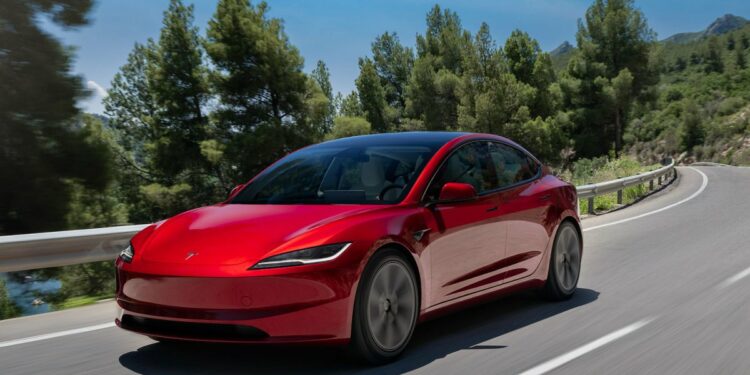(Image: ACEA)
The largest growth was recorded in Poland (up 16.1 percent to 552,000 new registrations), Bulgaria (up 13.8 percent to 43,000) and Hungary (up 12.9 percent to 122,000). Finland (-15.4 percent to 74,000), Latvia (-7.4 percent to 17,000) and Sweden (-7 percent to 270,000) saw the sharpest declines. There were no dramatic shifts in the car market in the EU as a whole. There are no major growth figures in the saturated market, but there are also no signs of a drastic slump in sales.
Electric cars
However, some manufacturers are likely to be concerned about how sales of electric cars have developed over the past year. It is true that strong progress was made in individual markets in this respect; in Malta, for example, registrations of new electric cars rose by 91 percent. However, this could not compensate for the slump in the major markets. Overall, the number of electric car registrations in the EU fell by 5.9 percent to 1.45 million last year.
This path is dangerous for some manufacturers. This is because the tightened fleet limits for 2025 can hardly be achieved with combustion engines alone. Most suppliers will have to sell more electric cars than before, otherwise they will face high penalties. Manufacturers will counter this with cheaper models, and discounts are also to be expected. German Chancellor Olaf Scholz has spoken out in favor of a European purchase premium. However, it is unlikely that this idea will prevail. However, it can be assumed that subsidies will be introduced at national level after the federal elections.
Manufacturers in comparison
The car manufacturers’ success in 2024 also varied greatly. The market leader was the Volkswagen Group with its numerous brands, which sold a total of 2.84 million new cars. Except for Audi (-9.4 percent), all major Volkswagen brands were up – with Porsche (15.3 percent) and Skoda (13.6 percent) posting the strongest growth. At 1.3 percent, the increase was the lowest for the core VW Passenger Cars brand. In second place was the Stellantis Group, which sold 1.74 million new cars in the EU in 2024 – a decline of 7.2 percent. None of the brands were in the black, with Lancia/Chrysler (-27.2), Fiat (-20.8) and DS (-20) experiencing the sharpest decline. Opel sales fell by 5.6 percent.
The BMW Mini brand experienced a slight downturn in 2024, but the outlook for this year is good thanks to numerous new models.
(Image: Pillau)
With its three brands, the Renault Group recorded an overall increase of 1.9 percent, to which Alpine (6) and Dacia (3.7) contributed more than the core Renault brand (0.3). There was a strong upward trend for Toyota (17.5 percent growth) and a slight downward trend (-5.8 percent) for the Hyundai Group, which also includes Kia. The BMW Group also suffered slight losses in registration figures (-0.6), but the Bavarians will be able to live with the result. This is because the BMW brand sold slightly better and, with numerous new models, Mini is likely to perform better this year than in 2024. Among the other brands, Mitsubishi and Volvo stand out with 43.7% and 28% growth respectively. The Jaguar brand (-45), which is preparing a complete restart, saw the sharpest decline. Ford (-13.7) and Tesla (-13) also failed to match the previous year’s sales figures.
More on developments in the car marketMehr anzeigenWeniger anzeigen
(mfz)
Don’t miss any news – follow us on
Facebook,
LinkedIn or
Mastodon.
This article was originally published in
German.
It was translated with technical assistance and editorially reviewed before publication.
Source link : http://www.bing.com/news/apiclick.aspx?ref=FexRss&aid=&tid=678f844c266544ee85adbc0b8bbc9818&url=https%3A%2F%2Fwww.heise.de%2Fen%2Fnews%2FPassenger-car-market-2024-in-the-EU-e-cars-declining-but-not-everywhere-10250083.html&c=988735430388537192&mkt=de-de
Author :
Publish date : 2025-01-21 01:15:00
Copyright for syndicated content belongs to the linked Source.



